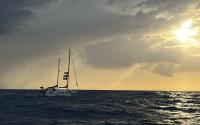Common Dreams / Published on Monday, May 24, 2004 by ReutersAlister Doyle
Global warming is hitting the Arctic more than twice as fast as the rest of the planet in what may be a portent of wider, catastrophic changes, the chairman of an eight-nation study has said.
Inuit hunters are falling more frequently through the thinning ice with habitats for plants and animals also disrupted. The icy Hudson Bay in Canada could be uninhabitable for polar bears within just 20 years.
The melting is also destabilising buildings on permafrost and threatening an oil pipeline laid across Alaska.
Benefits, for human commerce, might accrue from the opening up of a now largely icebound short-cut sea route from the Pacific to the Atlantic. Russia might also win easier access to oil and gas as the icecap shrinks and permafrost retreats.
The broader consequences are however disturbing.
"There is dramatic climate change happening in the Arctic right now...about 2-3 times the pace of the whole globe," said Robert Corell, chairman of the Arctic Climate Impact Assessment (ACIA), in an 1,800 page report to be handed to ministers in Iceland in November.
"If you want to know what the rest of the planet is going to see in next generation, watch out for the Arctic in the next 5-10 years," he told Reuters on Monday. The report combines input from scientists, indigenous peoples and eight Arctic rim nations.
The Arctic reacts most to global warming, blamed largely on emissions of gases like carbon dioxide from fossil fuels in cars and factories, partly because dark-coloured water or earth, once exposed, soaks up heat far faster than white ice or snow.
Some parts of Alaska have heated up 10 times more than the global average, said Corell, a senior fellow at the American Meteorological Society. Future temperature rises in the Arctic were likely to be twice the 1.4-5.8 Celsius (3-11 F) gain by 2100 forecast by a U.N.-led panel of scientists, he said.
KYOTO?
"I think it (climate change) can be stopped but we will need an aggressive response," Corell said. Global climate change may bring everything from disastrous floods or droughts to a rise in global sea levels that could swamp low-lying Pacific islands.
But environmentalists doubt that governments will decide strong action based on the ACIA report because the United States has pulled out of the U.N.'s Kyoto protocol, the main international scheme to tackle climate change.
Russian President Vladimir Putin said on Friday that he favoured ratifying Kyoto, which has already been backed by the other six Arctic rim nations -- Canada, Sweden, Finland, Norway, Iceland and Denmark.
"The (ACIA) report underlines how critical it is that we take action as soon as possible, first under Kyoto, to reduce emissions and invest in renewable energy," said Samantha Smith, director of the Arctic Programme at the WWF environmental group.
Among signs of change in the Nordic region, birch trees were taking over traditional reindeer lichen pastures, Corell said. The reindeer had to compete with elk and red deer moving north.
Corell said that the sea route between the Pacific and the Atlantic via the Arctic could open far earlier than expected by most previous studies, cutting shipping times compared to routes via the Suez or Panama canals.
"On average our models show that by 2050 the Northern Sea Route will be open about 100 days a year. Now it's open about 20 days," he said.






